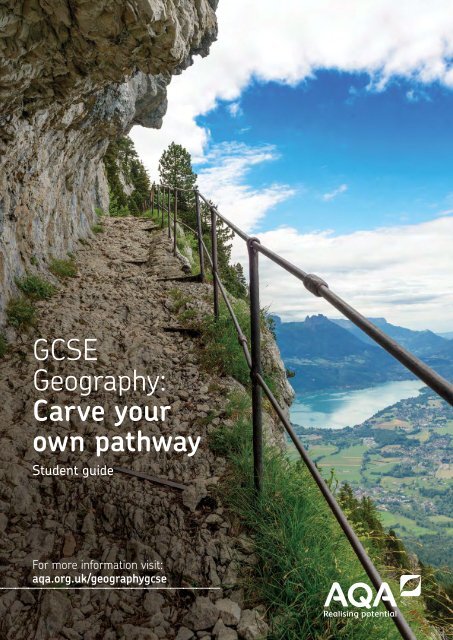GCSE Geography Carve your own pathway
AQA8035SG
AQA8035SG
You also want an ePaper? Increase the reach of your titles
YUMPU automatically turns print PDFs into web optimized ePapers that Google loves.
<strong>GCSE</strong><br />
<strong>Geography</strong>:<br />
<strong>Carve</strong> <strong>your</strong><br />
<strong>own</strong> <strong>pathway</strong><br />
Student guide<br />
For more information visit:<br />
aqa.org.uk/geographygcse
Why choose geography?<br />
Studying geography gives you the opportunity to travel the world via the classroom,<br />
learning about both the physical and human environment. You’ll understand how<br />
geography impacts <strong>your</strong> life every day and discover the key opportunities and challenges<br />
facing the world.<br />
What will I study?<br />
Over the two year <strong>GCSE</strong> course you will cover<br />
lots of interesting topics.<br />
Living with the physical environment<br />
Discover more about the challenge of natural<br />
hazards and the living world, physical landscapes<br />
of the United Kingdom and human interaction<br />
with them. This unit develops an understanding<br />
of the tectonic, geomorphological, biological and<br />
meteorological processes and features in different<br />
environments. It provides you with the knowledge<br />
about the need for management strategies<br />
governed by sustainability and consideration<br />
of the direct and indirect effects of human<br />
interaction with the Earth and the atmosphere.<br />
Challenges in the human environment<br />
This unit is concerned with human processes,<br />
systems and outcomes and how these change<br />
both spatially and temporally. You will develop<br />
an understanding of the factors that produce<br />
a diverse variety of human environments; the<br />
dynamic nature of these environments that<br />
change over time and place; the need for<br />
sustainable management; and the areas of current<br />
and future challenge and opportunity for these<br />
environments.<br />
How will I be assessed?<br />
You’ll have three written exams. Papers 1 and 2<br />
are 1 hour 30 minutes long and together, they<br />
contribute to 70 % of <strong>your</strong> final mark. Paper 3 is<br />
1 hour 15 minutes and contributes to the final<br />
30 % of <strong>your</strong> <strong>GCSE</strong> grade.<br />
Where will <strong>GCSE</strong> <strong>Geography</strong><br />
take you?<br />
Choose <strong>GCSE</strong> <strong>Geography</strong> and you’ll learn how<br />
today’s world was shaped and understand the<br />
challenges we face in the future. You’ll also<br />
examine the Earth’s natural resources and the<br />
increasing battles between the man-made and<br />
natural world.<br />
This knowledge, paired with <strong>your</strong> essential<br />
curiosity, will give you the sought-after<br />
transferable skills for success in further education<br />
and the workplace.<br />
2
<strong>GCSE</strong> GEOGRAPHY STUDENT GUIDE<br />
Which path will you take?<br />
• Travel writer<br />
• Expedition leader<br />
• Cultural arts officer<br />
• Aid worker<br />
• Diplomat<br />
• Lawyer<br />
• Retail management<br />
• Coastal engineer<br />
• Teacher<br />
• Military GIS specialist<br />
• Aerial surveyor<br />
• Pollution analyst<br />
• Conservation officer<br />
3
What skills will I learn?<br />
Alongside the subject content, you’ll also learn:<br />
• how to recognise the different sides in debates<br />
and make decisions based on sound argument<br />
• how to undertake a fieldwork enquiry<br />
developing transferable skills in research,<br />
data collection, analysis and evaluation<br />
• written/verbal communication skills, including<br />
report writing and data presentation<br />
• the highly regarded skills of being able to work<br />
independently and within a team, considering<br />
different ideas and coming to an agreed<br />
consensus<br />
• how to develop and use a wide range of maps<br />
from atlas to Ordnance Survey to maps in<br />
association with photographs<br />
• numerical and statistical skills.<br />
How will <strong>GCSE</strong> <strong>Geography</strong> fit in<br />
with my other subjects?<br />
<strong>Geography</strong> complements all subjects. According<br />
to bestcourse4me.com, the top <strong>GCSE</strong> courses<br />
taken alongside geography are:<br />
• economics<br />
• history<br />
• psychology<br />
• biology<br />
• languages<br />
• English.<br />
Can’t wait to get started?<br />
Your teachers are the best people to help you decide whether this course is the right choice for you.<br />
They’ll be as passionate as you to find the best subjects to develop <strong>your</strong> talents.<br />
For more information visit<br />
aqa.org.uk/geographygcse<br />
aqa.org.uk<br />
Copyright © 2016 AQA and its licensors. All rights reserved.<br />
AQA Education (AQA) is a registered charity (registered charity number 1073334) and a company limited by guarantee registered in<br />
England and Wales (company number 3644723). Registered address: AQA, Devas Street, Manchester M15 6EX.<br />
February 2016<br />
G00886


